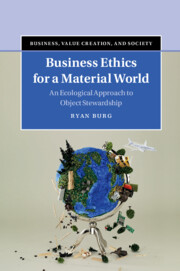'Objects can help us decide who should be responsible for what’. That is the premise of this fascinating study of the tentacles of ethics and responsibility surrounding objects and how they come to be what they are. Ryan Burg offers an insightful, rich, and comprehensive analysis of the ethics surrounding objects. This fresh - and refreshing - approach to business, individual, and societal responsibilities is very compelling and should find wide readership among both scholars and practitioners.'
Sandra Waddock - Galligan Chair of Strategy, Carroll School Scholar of Corporate Responsibility, Boston College Carroll School of Management
'Our gestalt for business ethics has been dominated by notions such as ‘stakeholder’, ‘social contract’ and ‘corporate governance’ - notions that position people in the foreground while leaving nature and objects in the background. This book erases this picture. It substitutes a deceptively simple concept of ‘singularity’ - one that sees everything (that is, every-single-thing) on its own terms, and in relationship to every other thing. We’ve been waiting for a schema that truly fits business into the natural environment. Here it is.'
Thomas Donaldson - Mark O. Winkelman Endowed Professor, The Wharton School University of Pennsylvania
'Business Ethics for a Material World, takes a unique perspective on corporate responsibility. Burg’s argument that material things provide important insights into the allocation of moral responsibility is an important and critical insight that has been neglected in the literature. This book will inspire new research from the perspective of materiality, and it is a ‘must read'.'
Patricia H. Werhane - Wicklander Chair in Business Ethics, DePaul University, Illinois
'Bringing to bear an extensive historical and contemporary knowledge of how people interact with their physical surroundings, Burg provides a new and vivid way to understand the complex interactions that constitute the value chains of the twenty-first century. Most of us, most of the time, have a thin and unreflective perception of the physical world around us. Burg invites us to see in the material of this world the myriad of hands, hearts, and minds that have gone into creating these things. Burg entreats readers to get to know - really know - the stuff that surrounds us, as both physical artifacts and cultural symbols.'
Robert Phillips - David Meade White, Jr Chair in Business, University of Richmond, Virginia
'Burg’s concept of ‘object’, ‘material’ or ‘matter’, and ‘thing’ is primordial, unique, and highly useful as a way of understanding many components of human behavior, business behavior, plus the ethical and value dimensions of all kinds of organizations. His concept broadens and deepens the investigative, research-based query into the nature and functions of ecological systems plus the associated responsibilities that ensue to those affected by such relationships. Indeed, this ‘singularity’ opens up traditional ethical inquiries to much more comprehensive analysis and inclusiveness than previously understood.'
William C. Frederick - Katz Graduate School of Business, University of Pittsburgh



